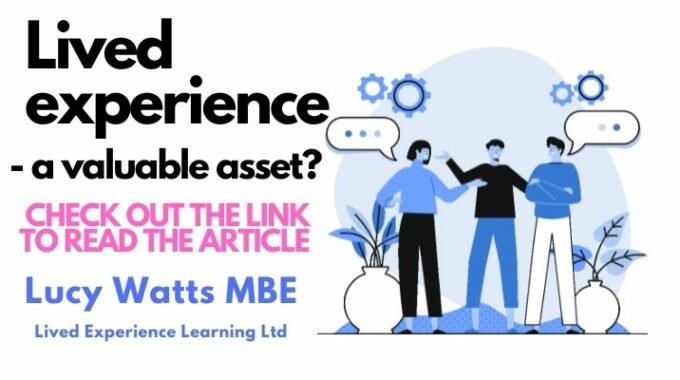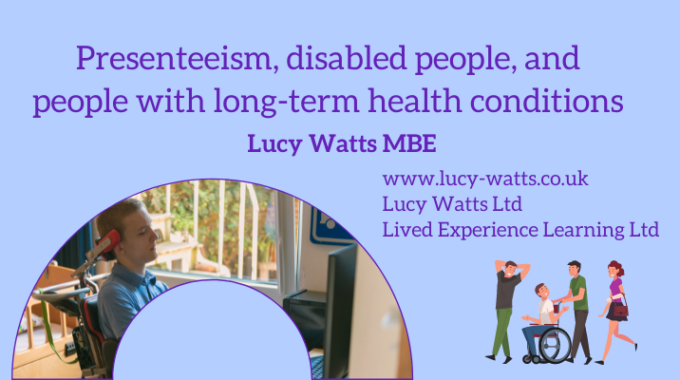Today I read this article in the New Statesman, talking about presenteeism — when people work…

What if lived experience was viewed and utilised as a valuable asset?
What if we viewed lived experience as an asset? As an asset of professional, economic, political, financial and social value?
“Lived experience” is a term often used in health and social care to denote the personal experience of people living with health needs, disabilities, impairments, diversity and disadvantage such as disabled people, unpaid carers, service users and marginalised communities. We talk greatly about involving people with lived experience in decision-making, commissioning, policy, service design and delivery, quality improvement and public advocacy. Yet, we don’t get it right. People with lived experience are often unpaid, giving up hours of time and attending meetings and events where everyone — except them — either is paid to be there, or is there under the role of their (paid) employment. Why isn’t lived experience valued in financial means? Why aren’t people remunerated for not just their expenses, but their time and contribution? Why do we see lived experience as a “nice to have”, not an imperative, integral part of an organisation, service, board or system?
I want us to go further. Lived experience isn’t only valuable in health, care, education and public services. It’s value in every sector.
I argue that we all have lived experience. That lived experience impacts upon our choices and decisions, our thoughts and feelings, our personal and political views, and it contributes greatly to the roles and activities we undertake, even if we don’t recognise it. It may be that prison officer who uses their experience of being a parent to ‘mother’ a younger inmate who is struggling. It might be that politician who was a victim of sexual assault who then fights for laws and awareness to help victims of sexual assault. It might be that barista who adapts their approach to a disabled client, using finger spelling sign language, or writing things down, or moving them aside to a quieter place for communication, because they have a disabled sibling and know the importance of that reasonable adjustment. Or it might be as distant as someone who has lived through addiction, not judging or blaming people living with an addiction for their predicament as they’ve been there. It might be that person who simply is kinder because they’ve had lived experience of disadvantage. That person who has the courage to talk to an individual about the person they have lost, saying their name, rather than avoiding the bereaved individual, purely because they know what it’s like to be bereaved. We all have lived experience in some way or another that affects our lives, our decisions, our work, our actions and behaviours, our approach to situations and our thoughts and opinions. How can that lived experience become an asset? An asset seen as having value? An asset that could transform the role a person undertakes because they have that extra layer of understanding and knowledge?
- What if we asked about lived experience that they feel benefits this role in interviews?
- What if we attached financial value to lived experience people can bring to a service, organisation, system, job or activity?
- What if we positively discriminated in favour of people with a particular lived experience to enhance the work of a business, organisation or the internal workings of a system?
- What if lived experience was actually recognised as an asset? Something of benefit and value? Something we seek out, rather than neglect, ignore or hide away?
There’s so much lived experience can have to offer us in our lives and our work. Businesses, organisations, public systems and services, charities, employers — lived experience can positive impact all of those, and more, if only we sought it out and turned it into a valuable asset that can transform productivity, efficiency, sustainability, longevity; to improve our workplace culture, transform the experience of our employees, enhance the outputs of a project, or improve a system to better support its beneficiaries, or transform organisational structure to make it a better place to work?
- Maybe next time you’re hiring for a role, consider asking about people’s lived experience — offer them an opportunity to talk about their personal life to see if they have an extra quality or understanding that may transform the role.
- Maybe next time you experience a situation or difficulty, consider how that might change your thoughts or feelings on an aspect of your life, work or employment.
- Maybe next time you judge someone for their past behaviours or mistakes, wonder whether there lies an opportunity in that experience for growth, change or transformation?
Lived experience is something we all possess. Our lived experience is unique to us. It has more than just personal value and personal impact. We need to start investigating our own lived experience and how it changes us, improves us, helps us grow, but also how it helps us in our work, how it enhances or impacts our actions and behaviours, how it changes our approach to situations, and how it changes or improves how we treat others.
For example, we see mental health as only relevant to those with mental illness, but we all have mental health. 1 in 4 of us will experience mental illness or mental ill health in our lifetime. What if we used our own mental health experience or difficulties to improve the way we structure and arrange our organisations, workplaces and systems? Helping them to be kinder, be more open to talking, be more open to and we utilised the lived experience of mental health of our employees and citizens to improve the way we treat and support our employees? What if kindness and compassion, team building and emotional support became integral to the daily operation of our businesses? What if we trained everyone on mental health first aid? What if we offered wellness days to our employees to take if they are struggling to work on our mental health — and how that may turn their lived experience into an asset for your business because it improves their performance and productivity?
How will you use your lived experience in future? How will you turn it into an asset with value?
My new business, Lived Experience Learning Ltd, is an upcoming education, training and e-learning business built around lived experience as an asset. Find out more at www.livedexperiencelearning.co.uk and do join our mailing list to find out when we formally launch.




This Post Has 0 Comments